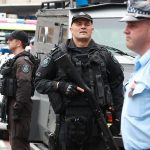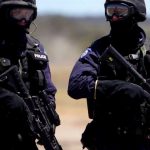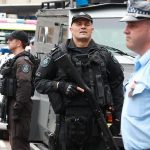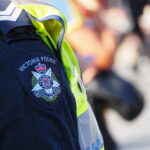The Increasing Militarisation of the NSW Police Force
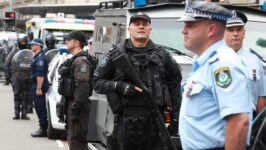
Most of us have noticed it, the ever-increasing beefing up of NSW police. There’s the fortified appearance, the enhanced weaponry and the broadening of powers to the point that those on the beat look more like members of an occupying paramilitary force than public protectors.
This is especially so regarding the nowadays ever-present Public Order and Riot Squad.
Peace activist Jacob Grech recently explained that this trend in decking out state police in a similar manner to ADF troops, commenced during the turn of the century Howard era, following 9/11 and coinciding with participation in constant war and the ongoing rollout of counterterrorism laws.
When pondering why this has occurred, the obvious conclusion is an escalation in crime. However, as former BOCSAR director Dr Don Weatherburn told Sydney Criminal Lawyers three years back, crime rates have been on a steady downturn since 2000. And this is still the case.
Established in 1829, the first modern police force, the Metropolitan London Police, was founded on the principle of policing by consent. But as former Senator David Leyonhjelm asserted last July, increasing militarisation is leading to the more sinister trope of police against civilians.
The thickening blue line
In December 2017, 47 NSW Police Force Public Order and Riot Squad officers were provided with M4 semiautomatics.
It was announced at the time that the rest of the 100-strong specialist team that commenced operations in 2006 would be provided with their own rifles by the following June.
The distribution of semiautomatics was in response to the findings of the coronial inquiry into the Lindt Café killings released in May 2017.
Enacted the following month, shoot-to-kill powers relating to incidents deemed terrorist were also a Berejikilian government response to the report, despite it noting that existing laws for police were adequate.
The NSW police is one of the largest force’s in the English-speaking world, even though our state has a relatively small population.
In mid-2018, there were 16,788 officers. But the premier still thought it necessary to announce later that year that she was adding 1,500 more officers to the force.
And this strengthening of the police is by no means solely aimed at targeting serious crime.
The continually increasing presence of drug dogs in public places and events over the last decade, has – over the second half of it – been accompanied by the use of strip searches to the point that state police now seem to be pitted against the younger population of NSW.
Sending in the troops
This militarisation of the domestic sphere is by no means exclusive to NSW. It’s happening right across the nation and in other western countries. And the Australian government has ensured that it’s not only the paramilitary police mobilising in opposition to the public.
Passed in late 2018, the Defence Call Out Bill provided powers for a streamlined deployment of ADF troops to assist state police with domestic incidents.
And in a stroke of luck for authorities, the COVID-19 pandemic has enabled a bolstering of police on the streets since the lockdown measures were first rolled out in late March this year.
Indeed, by mid-June and the lifting of pandemic restrictions, NSW police officers commenced showing up in opposition to protests in numbers not seen before.
And the most obvious hangover of enhanced lockdown powers was the prohibition on public assemblies that stood for a period of about three months and entailed police shutting down protests of more than 20 people gathered for “a common purpose”.


